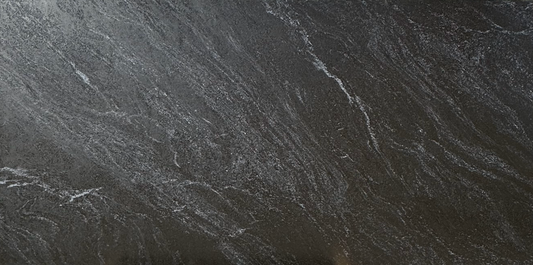Collection: Porcelain / Sintered Stone
Porcelain or sintered stone is a type of engineered stone that has gained popularity in recent years. Here are some specific features of porcelain/sintered stone and how they differ from other types of stones:
-
Composition: Porcelain or sintered stone is made through a manufacturing process that involves compacting ceramic materials, such as clay, feldspar, and silica, at high temperatures. The result is a dense and durable material that closely resembles natural stone.
-
Durability: Porcelain/sintered stone is highly durable and resistant to scratching, chipping, and impact. It is engineered to be stronger and less porous than natural stones like marble or granite. It is also less likely to stain or etch.
-
Versatility: Porcelain/sintered stone comes in a wide range of colors, patterns, and finishes, allowing for versatile design options. It can mimic the appearance of natural stone, wood, concrete, or other materials, providing flexibility in achieving different aesthetics.
-
Porosity: Porcelain/sintered stone is characterized by its low porosity, which means it absorbs minimal amounts of water or other liquids. This low porosity makes it highly resistant to stains, mold, and bacteria growth, making it suitable for both indoor and outdoor applications.
-
Heat Resistance: Porcelain/sintered stone has excellent heat resistance, allowing it to withstand high temperatures without being damaged or discolored. It can handle direct contact with hot pots and pans without the need for additional protection.
-
Maintenance: Porcelain/sintered stone is relatively easy to maintain. It requires minimal sealing, as it is non-porous. Regular cleaning with mild soap and water is usually sufficient to keep it in good condition. However, it is important to follow the manufacturer's recommendations for specific cleaning and maintenance instructions.
-
Thickness: Porcelain/sintered stone is available in various thicknesses, typically ranging from 6mm to 20mm. Thinner slabs are often used for wall cladding or veneers, while thicker slabs are suitable for countertops, flooring, and other heavy-duty applications.
-
Cost: Porcelain/sintered stone is generally more expensive than natural stones like granite or marble but can be comparable or slightly more affordable than some premium natural stones. The price can vary based on factors such as brand, design, thickness, and installation requirements.
It's worth noting that while porcelain/sintered stone offers many advantages, it may not have the same natural beauty and veining patterns as genuine natural stones. However, advancements in technology have allowed for more realistic replication of natural stone aesthetics in porcelain/sintered stone products.
When considering porcelain/sintered stone, it is recommended to work with a reputable supplier or fabricator who can provide accurate information about the specific product you are interested in and offer guidance on its suitability for your intended application.
-
 Sale
SaleKalila White
Regular price $1,200.00 USDRegular priceUnit price / per$1,800.00 USDSale price $1,200.00 USDSale -
 Sale
SaleKatharos White
Regular price $1,200.00 USDRegular priceUnit price / per$1,800.00 USDSale price $1,200.00 USDSale -
 Sale
SaleStratus White
Regular price $1,200.00 USDRegular priceUnit price / per$1,800.00 USDSale price $1,200.00 USDSale -
 Sale
SaleOcean Macaubus
Regular price $1,200.00 USDRegular priceUnit price / per$1,800.00 USDSale price $1,200.00 USDSale -
 Sale
SaleGemma Dark Gray
Regular price $1,200.00 USDRegular priceUnit price / per$1,800.00 USDSale price $1,200.00 USDSale -
 Sale
SaleFragrance Ash
Regular price $1,200.00 USDRegular priceUnit price / per$1,800.00 USDSale price $1,200.00 USDSale -
 Sale
SaleFiona White
Regular price $1,200.00 USDRegular priceUnit price / per$1,800.00 USDSale price $1,200.00 USDSale -
 Sale
SaleCalacatta Shanya
Regular price $1,200.00 USDRegular priceUnit price / per$1,800.00 USDSale price $1,200.00 USDSale -
 Sale
SaleCalacatta Paloma
Regular price $1,200.00 USDRegular priceUnit price / per$1,800.00 USDSale price $1,200.00 USDSale -
 Sale
SaleCalacatta Malia
Regular price $1,200.00 USDRegular priceUnit price / per$1,800.00 USDSale price $1,200.00 USDSale -
 Sale
SaleCalacatta Brianna
Regular price $1,200.00 USDRegular priceUnit price / per$1,800.00 USDSale price $1,200.00 USDSale -
 Sale
SaleBologna Gray
Regular price $1,200.00 USDRegular priceUnit price / per$1,800.00 USDSale price $1,200.00 USDSale -
 Sale
SaleAbyss Black
Regular price $1,200.00 USDRegular priceUnit price / per$1,800.00 USDSale price $1,200.00 USDSale -
 Sale
SaleOdysseus Copper
Regular price $1,200.00 USDRegular priceUnit price / per$1,800.00 USDSale price $1,200.00 USDSale -
 Sale
SalePlatinum Uma
Regular price $1,200.00 USDRegular priceUnit price / per$1,800.00 USDSale price $1,200.00 USDSale -
 Sale
SaleQuilla White
Regular price $1,200.00 USDRegular priceUnit price / per$1,800.00 USDSale price $1,200.00 USDSale
















